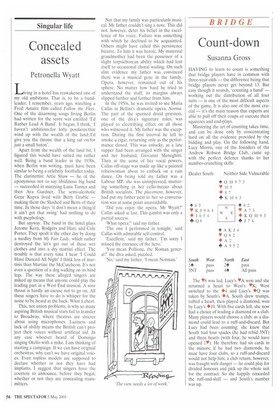Singular life
Concealed assets
Petronella Wyatt
Living in a hotel has reawakened one of my old ambitions. That is, to be a bandleader. I remember, years ago, watching a Fred Astaire film called Follow the Fleet. One of the disarming songs Irving Berlin had written for the score was entitled 'I'd Rather Lead A Band'. It began, I think, 'I haven't ambitions/for lofty positions/that wind up with the wealth of the land;/I'd give you the throne that a king sat on/for just a small baton'.
Apart from the wealth of the land bit, I figured this would have suited me rather well. Being a band leader in the 1930s, when Berlin was writing, must have been similar to being a celebrity footballer today. The clarinettist Artie Shaw — he of the eponymous not to say libidinous big band — succeeded in marrying Lana Turner and then Ava Gardner. The semi-alcoholic Gene Kupra lived with Betty Grable — making them the Sloshed and Betts of their time. In those days 'it don't mean a thing/if it ain't got that swing' had nothing to do with psephology.
But anyway. The band in the hotel plays Jerome Kern, Rodgers and Hart, and Cole Porter. They spoilt it the other day by doing a medley from My Fair Lady, which rather destroyed the let's get out of these wet clothes and into a dry martini effect. The trouble is that every time I hear Could Have Danced All Night' I think less of martinis than Martine the McCutcheon. It's not even a question of a dog walking on its hind legs. The way these alleged singers are miked up means that anyone could play the leading part in a West End musical. A sore throat is hardly an excuse not to go on. All these singers have to do is whisper for the noise to be heard at the back. What a cheat.
This, not union problems, is why so many aspiring British musical stars fail to transfer to Broadway, where theatres are stricter about using microphones. Laziness and lack of ability means the British can't project their voices without artificial aid. In any case whoever heard of Domingo singing Otello with a mike. I am thinking of starting a campaign. If we can have original orchestras, why can't we have original voices. Even topless models are supposed to declare whether or not they have had implants. I suggest that singers have the courtesy to announce, before they begin, whether or not they are concealing transmitters.
Not that my family was particularly musical. My father couldn't sing a note. This did not, however, deter his belief in the excellence of his voice. Failure was something with which he declined to be acquainted. Others might have called this persistence bizarre. To him it was heroic. My maternal grandmother had been the possessor of a slight terpsichorean ability which had lent itself to occasional choral wailing. On such slim evidence my father was convinced there was a musical gene in the family. Opera, however, remained out of his sphere. No matter how hard he tried to understand the stuff, its margins always slipped further and further from him.
In the 1950s, he was invited to see Maria Callas in Bellini's dramatic opera. Norma. The part of the spurned druid priestess, one of the diva's signature roles, was played to electrifying effect on all those who witnessed it. My father was the exception. During the first interval he left to smoke a cigar, returning only as the performance closed. This was unlucky, as a late supper had been arranged with the singer and her husband. Giovanni Meneghini. Then at the acme of her vocal powers, Callas off-stage was made up like a painted tribeswoman about to embark on a rain dance. On being told my father was a Labour MP, she was unimpressed, muttering something in her cello-mezzo about British socialists. The placement, however, had put my father next to her so conversation was at some point unavoidable.
'Did you enjoy the opera, Mr Wyatt?' Callas asked at last. This gambit was only a partial success.
'What opera?' said my father.
'The one I performed in tonight,' said Callas with admirable self-control.
'Excellent,' said my father. 'I'm sorry I missed the entrance of the hero.'
'You mean Pollione, the Roman general?' the diva asked, puzzled.
'No,' said my father. 'I mean Norman.'










































































 Previous page
Previous page